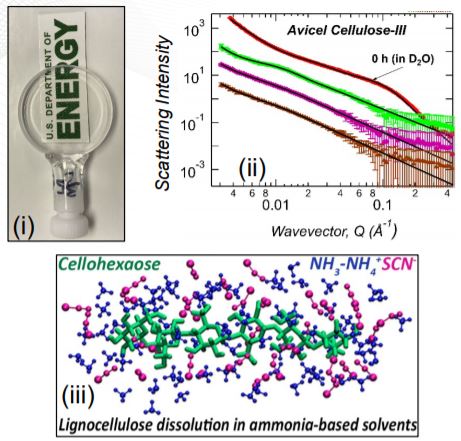Ammonia-Salt Solvent Promotes Cellulosic Biomass Deconstruction Under Ambient Processing Conditions
11/29/2019

(i) Solution of cellulose III dissolved in deuterated A:At solution. (ii) Selected time-resolved SANS profiles of deuterated A:At solvent treated cellulose-III. (iii) Cellohexaose configurations in A:At solvent determined using atomistic MD simulations. [Reproduced from Chundawat, et al. 2019 with permission from The Royal Society of Chemistry].
Scientific Achievement
A new highly efficient ammonia:ammonium salt (A:At) solvent-based biomass pretreatment was devised. Using time-resolved small-angle neutron scattering, it was possible to determine the mechanism of dissolution of crystalline cellulose into a “molecular” solution. Complementary molecular dynamics simulations showed how the A:At solvent disrupted the cellulose hydrogen bonding network.
Significance and Impact
A:At-pretreated cellulose requires ∼50-fold less enzyme for saccharification into fermentable sugars for biorefining. The reaction takes place under ambient conditions, requiring much less energy input compared to most conventional thermochemical pretreatment processes.
Research Details
Time-resolved small-angle neutron scattering (SANS) studies performed in deuterated A:At solvents revealed the structural changes in cellulose as they occurred. Enzyme digestion studies quantified the efficiency of the reactions. A:At solvent allowed 80-85% recovery of lignin from corn stover under ambient pretreatment conditions.
Funding Acknowledgements
Molecular dynamics and SANS studies on Bio-SANS were supported by the Office of Biological and Environmental Research (OBER)-funded Center for Structural Molecular Biology (CSMB) under contract FWP ERKP291 and the Bio-Fuels Science Focus Area under contract FWP ERKP752, using the High Flux Isotope Reactor supported by the Office of Basic Energy Sciences (BES), U. S. Department of Energy (DOE).
Related Links
- BER Resource: Center for Structural Molecular Biology
- News: How to Make it Easier to Turn Plant Waste into Biofuels
References
Chundawat, S. P. S., et al. “Ammonia-Salt Solvent Promotes Cellulosic Biomass Deconstruction under Ambient Pretreatment Conditions to Enable Rapid Soluble Sugar Production at Ultra-Low Enzyme Loadings.” Green Chemistry. 2020, 22, 204–218. [https://doi.org/10.1039/C9GC03524A]
